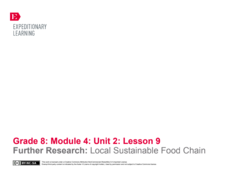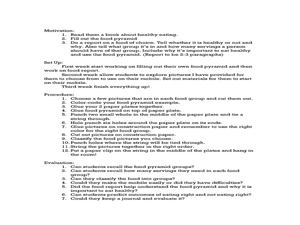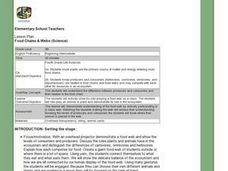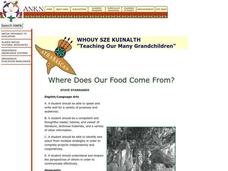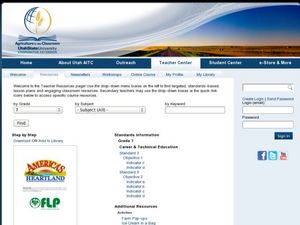K20 LEARN
Taking a Bite! Exploring Cultural Identity Through Food
High schoolers are asked to consider the connections between food, culture, and identity. They read articles and share what they learned in a jigsaw activity, read a short story, and make a claim about the story's theme, backing up their...
EngageNY
Local Sustainable Food Chain: Determining Cascading Consequences Using The Omnivore’s Dilemma
What are the consequences of the local, sustainable food chain? Research teams explore the question as they review Michael Pollan's The Omnivore's Dilemma. The teams complete Cascading Consequences charts and then choose research topics...
EngageNY
Further Research: Local Sustainable Food Chain
Researchers review how to create citations, find reliable sources, and paraphrase. Next, using guided task cards and their researcher's notebooks, they investigate the question they developed in instructional activity eight about the...
EngageNY
Adding to Cascading Consequences and Stakeholders: Local Sustainable Food Chain
Equip the class to perfect their presenting skills. To prepare for an upcoming oral presentation, scholars create and analyze an anchor chart for effective speaking skills. Pupils also use their research to add to their Cascading...
Media Smarts
Packaging Tricks
As part of their study of how advertisers use various techniques to influence consumers, kids examine the design, the promotions, and the product placement in the packaging of their favorite foods.
EngageNY
Reading for Gist and Answering Text-Dependent Questions: Industrial Food Chain
Where do humans fall on the food chain? Scholars read about the Industrial Food Chain in The Omnivore’s Dilemma sections. They use word catchers to record unfamiliar words as they read and place sticky notes in the margins to annotate...
EngageNY
Determining Main Ideas and Details to Write a Summary Paragraph: “Food”
Let's eat! Scholars read pages 24-25 of The Inuit Thought of It to discover the foods eaten by the Inuit. They sketch a visual gist of the section in their journals and write a summary paragraph about the text.
Curated OER
Food Safety to Prevent Food-Borne Illness
Students examine strategies and guidelines to prevent food-borne illnesses and contamination through proper handwashing, handling of foods, and food preparation. They review fact sheets on food-borne illnesses, and watch and discuss...
Curated OER
Food Chains and Food Webs
Fourth graders study intertidal organisms and their role in the food web. In this food web activity, 4th graders read the book The Sea That Feeds Us and discuss food webs. Students study pictures of intertidal creatures and discuss their...
Curated OER
Food Security/Insecurity
Students gain awareness of global patterns of food distribution. They are introduced to the concepts of food security and food insecurity. Pupils investigate the nutritional status of others around the world using information from the...
Curated OER
Bizarre Food
Students research foods from other countries. In this multicultural food lesson, students view a list of foods that kings and queens ate on an overhead transparency and go to the website www.jamessolheim.com/teachers1.htm to read about...
Curated OER
Food Pyramid Mobile
Third graders study the food pyramid. In this diet lesson, 3rd graders discuss healthy foods, food servings, and food groups. Students cut out a few pictures from magazines representing each food group and create a mobile of the food...
Curated OER
Food Chains & Webs
Fourth graders examine roles of animals in food chain, explore roles of humans, plants, and animals in ecosystem, create their own food webs, and role play producers, consumers, and decomposers.
Curated OER
Down with Dairy and the Food Pyramid
Students discuss food pyramid, name parts of pyramid, discuss dairy products and how they are beneficial to people, and participate in dairy taste testing.
Curated OER
Food Pyramid and Dietary Guidelines
Students examine Food Guide Pyramid and Dietary Guidelines. They look at samples of serving sizes, sort different foods into their correct groups, complete worksheets to discover which types of foods they eat regularly, and discuss...
Curated OER
Food Chains and Food Webs
Fourth graders investigate food chains. In this living environment lesson, 4th graders begin to understand the interdependence of organisms. Students describe the connections organisms have to the ecosystem. Students research online,...
Curated OER
My Favorite Breakfast Foods
First graders consider the importance eating breakfast. In this breakfast foods lesson, 1st graders plan meals, examine a variety of breakfast options, and discuss the food groups. Students taste a variety of foods. Extension activities...
Curated OER
Health and Food Safety
Students discuss ways to keep healthy, and examine factors that influence health, including media. They then participate in mock public meeting on genetically modified foods in order to explore importance of governmental decisions in...
Curated OER
WHERE DOES OUR FOOD COME FROM?
Students examine the sources, location and availability of local food, develop mapping skills, interact with Elders to gain pertinent information, and examine subsistence issues of the past and present.
Foreign Policy Association
U.S. and Europe Online Lesson Plan
Class groups investigate the economic and political implications of a country's policies on genetically modified foods, craft a position paper detailing that policy, and share their findings with the class. Armed with this information,...
John Hopkins University
Diets and Influence on Food Choice
From start to finish, this is a truly excellent lesson plan addressing the epidemic of diet-related disease in the United States. Learners begin with a reading excerpt of detailed information on trends in the American diet and the...
Curated OER
America's Heartland: Step-By-Step Lesson Guide
An excellent resource gets kids looking at agricultural production to better understand the careers needed in distributing foods from the farm to the consumer. Book, poster, web, and video links are included for teacher use. There is...
Curated OER
Food Insecurity
Explore food insecurity and resource scarcity with your class. They discuss the sharing of scarce resources, how to be good caretakers of these resources, and how choices impact the entire world.
Pulitzer Center
Food Insecurity
Food insecurity, whether as a result of food scarcity or a lack of nutritious food, is a growing and serious problem in the world today. After discussing the concept of food insecurity, learners listen to an NPR radio broadcast on the...
Other popular searches
- Food Pyramid
- Food Chains
- Food Groups
- Food Webs
- Food Labels
- Food Safety
- Desert Food Chain
- Esl Lessons Food
- Animal Food Chain
- Deciduous Forest Food Chains
- Nutrition Labels
- Healthy Foods




